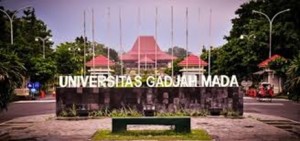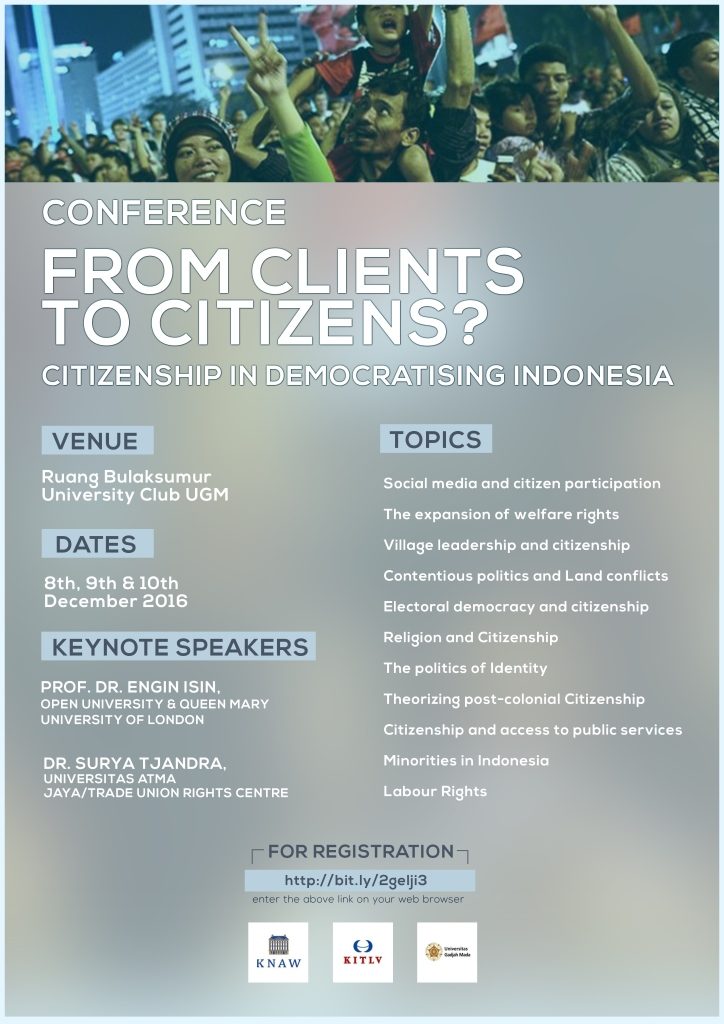8-10 December 2016 | Universitas Gadjah Mada, Yogyakarta | Indonesia
Organised by: Royal Netherlands Institute for Southeast Asian and Caribbean Studies (KITLV) and Universitas Gadjah Mada
Keynote Speakers: Engin Isin (Open University, UK) and Surya Tjandra (the Trade Union Rights Centre)
What is the impact of Indonesia’s democratization process on everyday interactions between Indonesian citizens and power holders? Democratic reforms have led to a much livelier public sphere, freer and more active public debate and more intensive political participation. Yet democratization seems to have done little to end the predatory and clientelistic practices of political elites. The persistence of these practices and the ‘stalling’ of Indonesia’s democratization process cannot be attributed solely to institutional shortcomings or selfish behaviour of elites. Instead, there is an urgent need to study politics ‘from below’ by examining the character of citizenship in Indonesia.
Indonesian newspapers rarely discuss the challenges facing the country in terms of citizenship. Conversely, citizenship studies has also paid surprisingly little attention to the forms that democratic citizenship takes in a postcolonial country like Indonesia. As citizenship is generally studied in the context of a liberal, high-capacity welfare state, there has been relatively little attention paid to the forms of democratic citizenship in the context of a weaker institutionalized state and a predominantly clientelistic political system. As a result the analysis of state-citizen interaction in postcolonial states all too often takes a narrow form of identifying ‘absences’ or deviations of (idealized) western patterns of citizenship. In Indonesia the rights-claiming, autonomous and individualistic citizen – as celebrated in the general literature on citizenship – might be found, but a focus on this particular type of citizen is hindering a much-needed understanding of a more wider range of state-citizen interactions.
Instead, the everyday forms of state-citizen interactions observable in Indonesia can be used as an opportunity to re-conceptualize our interpretation of what citizenship is or should be. Ideas about the proper ‘civic’ behavior of citizens might be shaped by different emphases on, for example, individual vs. collective rights, rights vs. duties, as well as different conceptions of political legitimacy. We need to capture these different attachments to be able to understand the different forms that citizenship may take. What kinds of conceptions and practices of rights, reciprocity and representation are observable in Indonesia? How can we describe the impact of Indonesia’s democratic reforms on everyday interactions between citizens and the state? How do particular features of Indonesia’s history and political economy – e.g. its legal pluralism, weakly institutionalized state, relatively large informal economy and clientelistic political arena – shape these emerging forms of citizenship?
With this objective this conference aims to bring together accounts of how citizenship is being practiced and perceived in Indonesia. In particular, this conference calls for papers on the everyday practices, values and attitudes that can be observed in the way citizens deal with state institutions and authorities. Papers may discuss the historical evolution of citizen rights as well as a wide range of everyday citizenship struggles involving, for example, the way people engage in land conflicts, arrange access to welfare or public services or claim recognition of ethnic identities or religious values.
Panels will be organised at the least around the following themes:
-Social media and citizen participation
-The expansion of welfare rights
-Village leadership and citizenship
-Contentious politics and Land conflicts
-Electoral democracy and citizenship
-Religion and Citizenship
-The politics of Identity
-Theorizing post-colonial Citizenship
-Citizenship and access to public services
-Minorities in Indonesia
-Labour Rights
This conference has grown out of the research program ‘From Clients to Citizens? Emerging Citizenship in Indonesia’, a research collaboration between Universitas Gadjah Mada (fakultas Ilmu Budaya and FISIP), KITLV, Leiden University and the University of Amsterdam funded by the Dutch Academy of Sciences (KNAW) and the Indonesian Ministry of Education (DIKTI).
Information for paper presenters
Paper submission is closed. Selected presenters are already notified and are expected to submit full papers by 15 November. Papers and presentations should be in English. The best papers presented at the conference will be selected for inclusion in a peer-reviewed volume on Citizenship in Indonesia. Accommodation will be provided for paper presenters.
Conference registration
We encourage students and scholars who are interested in attending the conference as observing participants to register in advance.The registration fees is Rp. 100.000 for general participants and 50.000 for students. Registration on a first come first basis as seats are limited. You can register by clicking on the registration button.

Professor Engin Isin holds a Chair in Citizenship and is Professor of Politics in Politics and International Studies (POLIS) at the Faculty of Social Sciences, The Open University. He has published widely on the politics of citizenship involving various sites, scales and subjects. From Cities Without Citizens (1992) to Being Political (2002) and Acts of Citizenship (2008) his concern has been to document historically how citizenship has been contested by its ‘others’ (strangers, outsiders, aliens) and how their claims to rights has constituted them as responsible subjects. His latest book Citizens Without Frontiers elaborating on the themes of his Inaugural Lecture is just published. His current research projects include Oecumene: Citizenship after Orientalism and Enacting European Citizenship (ENACT). Prof. Isin is the co-chief editor of Citizenship Studies. An overview of his research and publications can be found on his website.

Surya Tjandra is a labour activist-turned academic, who was associated with the Legal Aid Institute (LBH) Jakarta for many years, and is now involved in a labour service NGO, the Trade Union Rights Centre. He lectures in labour law at Atma Jaya Catholic University, Jakarta. In 2016 he defended his PhD at Leiden University entitled Labour Law and Development in Indonesia. This book discusses the political economy of the labour law reform in Indonesia after the Reformation. He has organised civil society campaigns on the implementation of Indonesia’s social security law, and recently came close to being selected as one of the commissioners of Indonesia’s Anti Corruption Commission, KPK.
He has presented papers on Indonesian labour law and trade unions issues nationally and internationally, and has been working closely with the Friedrich Ebert Stiftung and the DGB Bildungswerk. He has also published several books including “Kompilasi Putusan Pengadilan Hubungan Industrial Terseleksi: 2006-2007” (2008), the first compilation of the newly estalished Industrial Relations Courts’ decisions in Indonesia, and “Makin Terang Bagi Kami: Belajar Hukum Perburuhan” (2006), which provides an alternative socio-legal approach on the labour law studies in Indonesia.
The conference will take place at Universitas Gadjah Mada, Yogyakarta, Indonesia. You can find all the venues in the programme overview.
Program
Day 1: Thursday 8 December
| 12:00 – 13:45 Lunch Opening ceremony is preceded by lunch Venue: in front of the Bulak Sumur Hall |
| 14:00 – 14:30 Opening ceremony Venue: Bulak Sumur Hall, University Club, UGM |
|
14:30 – 15:30 Keynote lecture – Doing Citizenship by Engin Isin |
|
15:30-16:00 Tea Break |
|
16:00 – 17:30 First Panel Sessions |
|
A. Citizenship and Migration |
B. Clientelism |
| Venue: Grafika (second floor)
Chair: Patricia Spyer (Graduate Institute Geneva) |
Venue: Yustisia (second floor) Chair: Nankyung Choi (Leiden University) |
|
Safrudin Amin (Dept. of Social Anthropology, Kahirun University) The Vulnerable Citizenship of Migrant in Contested Areas: The case of Makeanese in North Halmahera, North Malaku |
Nono Stevano Agustinus (Universitas Sam Ratulangi, Manado) Visi, Misi, Gizi, Pici, Ruci: Cultural roots within vote buying practices in 2014 Legislative Election (The Case of North Sulawesi, Indonesia) |
|
Yearry Setianto (Department of Communication Studies, Sultan Ageng Tirtayasa University) Challenging Citizenship from Afar: Indonesian Diaspora’s Transnational Political Communication on Dual-Citizenship |
Gilbert Sanjaya (University of Oxford) Schematising Rural Politics in Indonesia: the Analysis of Strategic Electoral Competition in Sintang Regency |
|
Laila Kholid Alfirdaus (Government Department, Faculty of Social and Political Science, Diponegoro University) Disengaged Citizen: Involuntarily returned and relocated transmigrants in Southern Kebumen |
Anggun Susilo and Restu Karlina (University of Brawijaya) Clientelism in Indonesian bureaucratic reform: Rethinking the pathologies of governance Case Studies in Malang regency and Blitar municipality, East Java |
|
Vita Febriany From motherhood to citizenship: Women volunteers in Indonesian community based health care program (Posyandu) |
Gerrit Gonschorek (Institute for Economic Research, University of Freiburg) To the ones in need or the ones you need: The Determinants of Central Discretionary Government Grants for Infrastructure, Empirical Evidence from Indonesia |
|
19:00 Conference dinner |
Day 2: Friday 9 December
|
9:00 – 10:30 Second Panel Session |
|
C. Theorizing Indonesia’s Post-colonial citizenship |
|
Chair: Bambang Purwanto (Gadjah Mada University) |
|
Ahmad Rizky M Umar (Department of Politics, University of Sheffield) Theorising Post-Colonial Citizenship in Indonesia: A Historical International Relations Perspective |
|
Ward Berenschot (KITLV) Mediated Citizenship and Indonesia’s Postcolonial State |
|
Gerry van Klinken (KITLV) Historical Lineages |
|
Olle Tornquist, Linda Savirani, Willy Purna Samadhi Reclaiming the State; Overcoming Problems of Democracy in Post-Soeharto Indonesia |
|
10:30 – 10:45 Break |
|
10:45 – 12:15 Third Panel Session |
|
Venue: Grafika (second floor) Chair: Deasy Simanjuntak (ISEAS) |
Venue: Yustisia (second floor) Chair: Surya Tjandra (U. Atmajaya) |
|
Chris Chaplin (KITLV) Salafi Islamic Piety as Civic Activism? Wahdah Islamiyah and the Promotion of Islamic Inspired Citizenship in South Sulawesi |
Akhmad Faqihuddin (Universitas Gadjah Mada) Discussing Minimum Wage in Fundamental Worker Rights |
|
Mohammad Zaki Arrobi (Department of Sociology, UGM) Citizenship and the Contestation over Identity Politics at the Local level in Indonesia: A Study on Multiple Citizenship among Islamist Groups in Yogyakarta |
Hari Nugroho (Leiden University) Broadening the Fields: workers movements in Post-authoritarian Indonesia |
|
Carolus Bregas Pranoto / Harlitus Berniawan Telaumbanua (Universitas Indonesia) Politics of Identity and Territorial Claim-Making in Contemporary Subnational Indonesia: Lessons from North Sumatra and Yogyakarta |
Arianto Sangadji (York University) Mine workers and Class Politics |
|
Rizky Alif Alvian (Department of International Relations, Universitas Gadjah Mada) Citizenship and the Politics of Space in Indonesia: Reflections on the Politics of Pluralism in DI Yogyakarta |
Mary Austin (SOAS: School of Oriental and African Studies, University of London) Claiming a seat at the table: two women and the struggle for a domestic workers’ law |
| Sheri Gibbings (Wilfrid Laurier University) The Politics of Public Transportation: Deterritorialization and Reterritorialization of City Buses in an Indonesian City |
| 12:15 – 13:30 Lunch Break Venue: in front of Bulak Sumur Hall, University Club |
| 13:30 – 15:00 Fourth Panel Session |
|
F. Citizenship in Villages |
G. Human Rights |
|
Venue: Grafika (second floor) Chair: Jacqueline Vel (KITLV/Leiden Univ.) |
Venue: Yustisia (second floor) Chair: Henk Schulte Nordholt (KITLV) |
|
Thushara Dibley (University of Sydney) Disability, citizenship and international aid in Indonesia |
|
Rahmad Hidayat (LAKPESDAM PCNU Bima) Residential Segregation and Its Impact on the Villagers’ Comprehension about Citizenship |
Vannessa Hearman (Charles Darwin University, Australia) Global human rights norms and enforcement of citizenship rights: the case of post-authoritarian Indonesia |
|
Restu Karlina Kouwagam (University of Brawijaya) How Clientelism Influence the Public Service Quality in Banten Province Indonesia |
Rian Adhivira Prabowo (Satjipto Rahardjo Institute) Pancasila as Political Identity, Bare Life, and State of Exception: The Neglected Rights of ‘Half’-Citizenship of Victim of 1965 Gross Violation of Human Rights in Indonesia |
|
Prio Sambodho (University of Amsterdam) Menyindir the State : Everyday Citizenship Claims in a West Java Village |
Retna Hanani (University of Amsterdam) Performing care: rights claiming and urban poor access to health care in Jakarta |
|
15:30 – 16:45 Keynote lecture – Labour Movement and Democracy in Indonesia: The New Frontier by Surya Tjandra |
|
Venue: Bulak Sumur Hall, University Club, UGM Moderator: Henk Schulte Nordholt (KITLV) |
|
17:15 Leaving for Prambanan |
|
18:30 Dinner at Prambanan |
Day 3: Saturday 10 December
| 9:00 – 10:30 Fifth Panel Session |
|
Venue: Grafika (second floor) Chair: Olle Törnquist (U. Oslo) |
Venue: Yustisia (second floor) Chair: Suzie Handajani (UGM) |
|
H. Contentious Politics |
I. Digital Citizenship |
|
Yuva Ayuning Anjar (Department of Sociology, Universitas Gadjah Mada Gerakan Fajar Nusantara : Protest or Solution? |
Sri Mastuti (SILE) The Role of Community Media With Smart Phone in Building Citizenship Participation A Case Study Lette Community in Makassar |
|
Andrey Damaledo (Anthropology, ANU) Transforming Politics: Active and Activist Citizenship among East Timorese in West Timor |
Gusti Agung Ayu Kade Galuh (Independent Researcher) Social Media, Online Activism, and Indonesian Middle Class |
|
Paul Kellner (University of Oxford Department of International Development) “Beggar” or “Musician”: Negotiating Categories and Legitimacy as a Busker in Yogyakarta |
Muhammad Zamzam Fauzanafi (Leiden University/Gadjah Mada University) “Defacing The Dynasty”: Digital Acts of Citizenship and Anti-corruptions Campaigns in Banten, Indonesia |
|
Joash Tapiheru (Department of Politics and Government, Universitas Gadjah Mada) Citizenship struggle through Welfare Justice Movement: Case in four districts in Indonesia (Bojonegoro, Kutai Kartanegara, Rembankg, and Manggarai) |
Kartiko Utami Wahyu (Gadjah Mada University) Literacy and Empowerment in Digital Citizenship |
|
Wasisto Raharjo Jati (Research Centre for Political Studies – Indonesian Institute of Sciences) The Pattern of Political Representation based on social media among Indonesian middle class |
|
10:45 – 12:15 Sixth Panel Session |
|
Venue: Grafika (second floor) Chair: Gerben Nooteboom (UvA) |
Venue: Yustisia (second floor) Chair: Sikko Visscher (KNAW) |
|
J. Land Rights |
K. Minority rights |
|
Santy Kouwagam (Van Vollenhoven Institute) Serving two Clients: Registering Land in Indonesia |
Nukila Evanty (University of Mahendradatta Bali and RIGHTS foundation) Recognition of Minorities in Indonesia |
|
Willem van der Muur (Van Vollenhoven Institute) Land disputes and the adat land rights movement in Indonesia |
Muhammad Rasyid Ridha Saragih (Komunitas Payung) The Right to be Recognized: Sunda Wiwitan Culture and Administration Law, a Reflection on Indonesian Religious Freedom Post Soeharto Era |
|
Yance Arizona (Epistema Institute) Act of Indigenous Citizenship: Lesson Learned from Marena Indigenous Community in Central Sulawesi |
Prof. dr. G.H. Addink and Awaludin Marwan (Utrecht University School of Law) Good Governance in the Context of Ethnic Minorities in Indonesia |
|
Tanya Jakimow (University of New South Wales (UNSW Australia) Volunteering and political subject-making in Medan |
Jessica Soedirgo (University of Toronto) Citizenship Gaps and Clientelism Structures: Religious Minorities in Indonesia |
|
12:15 – 13:30 Lunch break |
|
13:30 – 15:00 Seventh Panel Session |
|
Venue: Bulak Sumur Hall, University Club, UGM Chair: Ward Berenschot (KITLV) |
|
L. Representation |
|
Ngurah Suryawan (Anthropology Department University of Papua Manokwari Papua Barat) The Making of New Elites of Papua |
|
Ashari Cahyo Edi (Department of Politics and Government, Universitas Gadjah Mada) Transformational Leadership? Understanding How Leadership Cultivates Democratic Citizenship in Panggungharjo, Bantul, Yogyakarta |
|
Olle Tornquist, Luky Djani, Surya Tjandra, Osmar Tanjung (University of Oslo) Beyond populist transactionalism: What are the prospects now for popular politics in Indonesia |
|
Lene Pederson (Central Washington University) Revolution in the Kerajaan: Democratic Reform and Clientelism at the Grassroots |
|
15:00 – 15:30 Closing Ceremony |
Registration for this conference is closed.
The maximum number of participants has been reached.
Important dates
15 November: deadline for full papers by selected paper presenters
8-10 December: conference
Organising Committee
Ward Berenschot (KITLV): berenschot[at]kitlv.nl
Gerry van Klinken (KITLV): klinken[at]kitlv.nl
Suzie Handajani (UGM): suzie_handajani[at]yahoo.com
Contact
Yayah Siegers (KITLV): kitlv[at]kitlv.nl
Sarthak Bagchi (KITLV): citizenshipugm[at]gmail.com
Organisations








